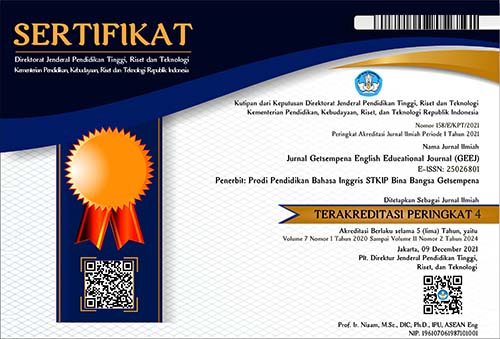EXPLORING LEARNERS’ AUTONOMY IN ONLINE LANGUAGE-LEARNING IN STAI SUFYAN TSAURI MAJENANG
Abstract
The impact of the coronavirus outbreak on the education system is inevitable that higher education institutions choose to transform their instructional practices to entirely online using specific platforms. This shifting comes with challenges to students as they are demanded to be independent and autonomous. This study investigated the students’ readiness and perception towards being an autonomous learner in online language-learning. This case study investigated 25 students who joined online language learning by the WhatApps group in an English department of STAI Sufyan Tsauri Majenang. The data were gained by giving an online questionnaire, having an online interview with some students who were chosen randomly, and also assigning students self-report. The data showed that the students do not have enough autonomy in online language-learning. It means that the students are not ready to be autonomous learners in online language learning. The result of the study indicated that the students prefer having a face to face class and direct guidance from the teacher where 66.9% of the same students prefer learning in class or face to face meeting. In comparison, only 18.5 % who share no problem having an online class. 14.6% of them enjoy both options. This finding suggests that teachers need some strategies to promote and foster students’ learner autonomy to achieve learning objectives in online language learning.
References
Adamson, J., & Sert, N. 2012. Autonomy in learning English as a foreign language. International Journal of Global Education, 1(2) 23-27.
Alonazi, Saleema M. 2017. The role of teachers in promoting learner autonomy in secondary schools in Saudi Arabia. English Language Teaching. 10(7), 183-190. Doi: 10.5539/elt.v10n7p183
Aminatun, D., Oktaviani, L. 2019. Memrise: Promoting students’ autonomous learning skills through language learning application. Metathesis: Journal of English Language, Literature, and Teaching. 3(2), 214-220. Doi: 10.31002/metathesis.v3i2.1982
Anggia, A., Nahdaleni, I. 2017. Learners’ Autonomy in Out-of-Class English Writing Learning Activity of the Third Semester Students of English Education Study Program of Universitas Bandar Lampung. English Education: Jurnal Tadris Bahasa Inggris. 10(2). 227-241.
Balcikanli, C. 2008. Fostering learner autonomy in EFL classrooms. Kastamonu Education Journal, 16(1), 277-284.
Begum, J. 2018. Learner Autonomy in EFL/ESL Classrooms in Bangladesh: Teachers’ Perceptions and Practices. International Journal of Language Education. 2(2), 96-104.
Borg, S. & Al-Busaidi, S. 2012. Learner autonomy: English language teachers’ beliefs and practices. London, England: British Council & the University of Leeds.
Holliday, A. 2003. Social autonomy: Addressing the dangers of culturism in TESOL. In D. Palfreyman, & R.C. Smith, (Eds.), Learner Autonomy Across Cultures: Language Education Perspectives. (pp. 110-126), New York: Palgrave Macmillan.
Kubota, R. 2002. The author responds (Un) Raveling racism in a nice field like TESOL. TESOL Quarterly, 36 (1), 84-92.
Lengkanawati, N. S. 2017. Learner Autonomy in the Indonesian EFL Settings. Indonesian Journal of Applied Linguistics, 24(2), pp. 222-231.
Littlewood, W. 2000. Do Asian students really want to listen and obey? ELT Journal 54(1), 31-36.
Little, D. 2002. Learner autonomy and language learning. Studies in English Language & Literature. 28(1), 229-242.
Merawati, M.J. 2016. Language Learning Autonomy and Language Research. Jurnal Bahasa Inggris Terapan 2(2). 1-8
Mısır, H., Koban, K., Didem., Engin K, Serdar. 2018. An analysis of learner autonomy and autonomous learning practices in massive open online language courses. Arab World English Journal. 4(4), 24-39. Doi: 10.24093/awej/call4.3
Onyema, E.M., Eucheria, N.C., Obafemi, F.A., Sen, S., Atonye, F.G., Sharma, A. and Alsayed, A.O. 2020. Impact of coronavirus on education. Journal of Education and Practice, 11(13), 108-119.
Reinders, H. 2010. Towards a classroom pedagogy for learner autonomy: A framework of independent language learning skills. Australian Journal of Teacher Education. 35(5), 40-55. Doi: 10.14221/ajte.2010v35n5.4
Serdyukova, Nataliya., Serdyukov, Peter. 2013. Student autonomy in online learning. CSEDU 2013 - Proceedings of the 5th International Conference on Computer Supported Education. Vol. 2, 229-233.
Sinclair, B. 1997. Learner autonomy: The cross-cultural question. IATEFL Newsletter, October-November, 139, 12- 13.
Smith, R., Kuchah, H., Lamb, M. 2017. Learner autonomy in developing countries. Autonomy in Language Learning and Teaching: New Research Agendas. 3(3), 7-27. Doi: 10.1057/978-1-137-52998-5_2
Wenden, A. L. 1997. Autonomy in language learning. System. 25(4). 584-588. Doi: 10.1016/0346-251x(97)90169-x
























